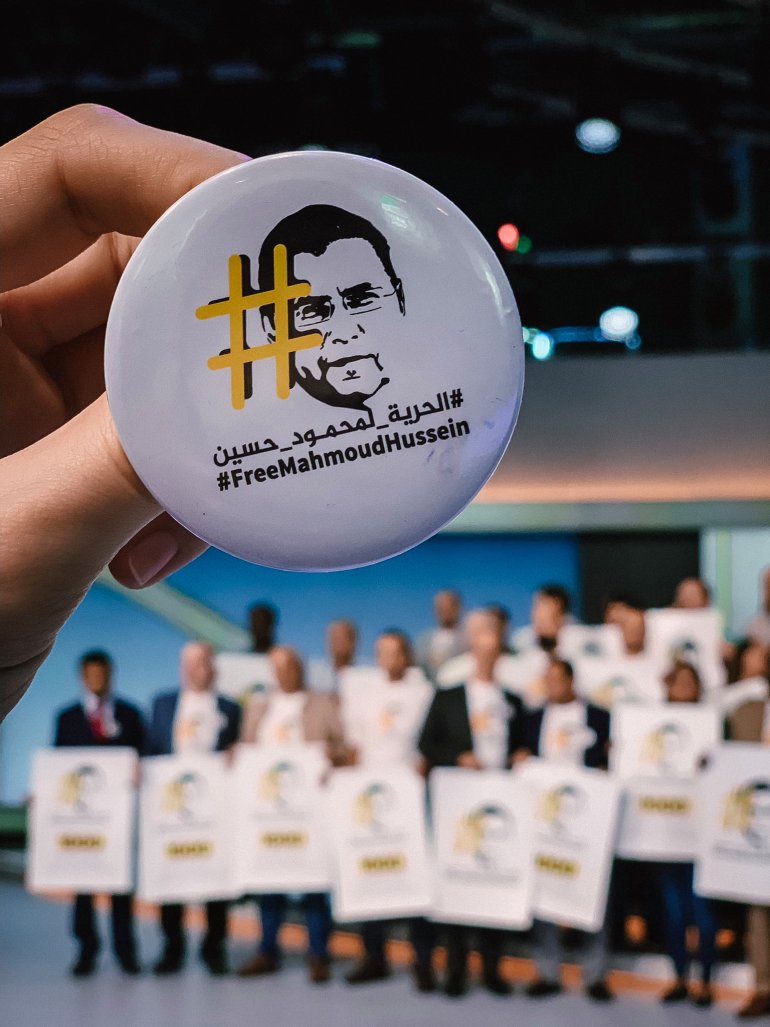Egypt has released Al Jazeera journalist Mahmoud Hussein after more than four years in detention without formal charges or trial.
Hussein, an Egyptian national held under preventive detention since December 2016, was released from jail on Saturday.
In a statement, Mostefa Souag, acting director general of the network, said the release of Hussein was “a moment of truth and an inspiring milestone towards press freedom”.
“Al Jazeera Media Network welcomes the news of Mahmoud’s freedom and believes that no journalist should ever be subjected to what Mahmoud has suffered for the past four years for merely carrying out his profession.
“Today, we are pleased he is finally reunited with his family, after being robbed four years from his life and deprived of his fundamental rights. We wish Mahmoud a speedy recovery and hope he will be able to overcome this past ordeal and start a new chapter in his distinguished career.”
Earlier on Saturday, Hussein’s daughter Az-Zahraa posted a message on Facebook saying, “Thank God the decision to release Baba has been implemented.
“… Today, Baba is in his house. Thankfully.”
Extended pre-trial detention
A father of nine, Hussein has decades of experience in reporting for Arabic-language news channels. After years of freelance work with Al Jazeera Arabic, Hussein joined the network full-time in 2010, first in Cairo, later in Doha.
The 54-year-old was arrested in Cairo on December 23, 2016, while visiting his family for a holiday. He was interrogated for more than 15 hours without a lawyer present, before being released and then arrested again days later.
Egypt’s Ministry of Interior publicly accused him of “disseminating false news and receiving monetary funds from foreign authorities in order to defame the state’s reputation”, but no charges were ever formally brought against him.
Shortly after his arrest, Al Jazeera launched a worldwide media campaign calling for his release.
Egyptian authorities, however, extended Hussein’s detention more than a dozen times, far surpassing the country’s maximum period for pre-trial detention in violation of both Egyptian and international law.
During his time in jail, Hussein suffered physically and psychologically. He was held for long periods in solitary confinement and denied proper medical treatment when he broke his arm in 2017.
In January 2018, the United Nations Working Group on Arbitrary Detention concluded that the conditions of Hussein’s imprisonment amounted to “cruel, inhuman and degrading treatment”.
 Al Jazeera launched an international campaign for the release of Mahmoud Hussein [Al Jazeera]
Al Jazeera launched an international campaign for the release of Mahmoud Hussein [Al Jazeera]
In May 2019, Hussein was transferred from Cairo’s Tora prison to a holding cell in Giza, in preparation for his release under “precautionary measures”. Under these measures, he was supposed to be freed from jail with only limited restrictions on his movement.
While waiting for final clearance, Hussein was suddenly transferred to a prosecutor’s office and then sent back to jail. His family waited in vain outside to greet him.
With no reason given, authorities overturned the decision to release him at the last minute and then announced that a new investigation had been opened against Hussein.
‘Symbol of press freedom’
There was no official comment by the Egyptian authorities on Hussein’s release on Saturday, which came a month after Egypt and Qatar restored ties following a Gulf summit held in Al-Ula, Saudi Arabia.
In June 2017, Egypt joined Qatar’s Gulf neighbours – Saudi Arabia, United Arab Emirates and Bahrain – in snapping ties with Doha and launching a blockade against it, alleging it backed terrorism and was too close to regional rival Iran. Qatar denied the claims.
“While he was incarcerated, Mahmoud had become a symbol of press freedom across the globe,” Souag said in his statement.
“On the day of his release, Al Jazeera calls for the freedom for all journalists who are unjustly imprisoned all around the world.
“We commend all international human rights organisations, media institutions, journalists for their continuous support and condemnation against the arbitrary detention of Mahmoud Hussein.
“On this day, Al Jazeera Media Network extends its gratitude towards those organisations, and all the voices of truth that have called for Mahmoud’s freedom and for the freedom of the press.
“Journalism is not a crime,” Souag concluded.






